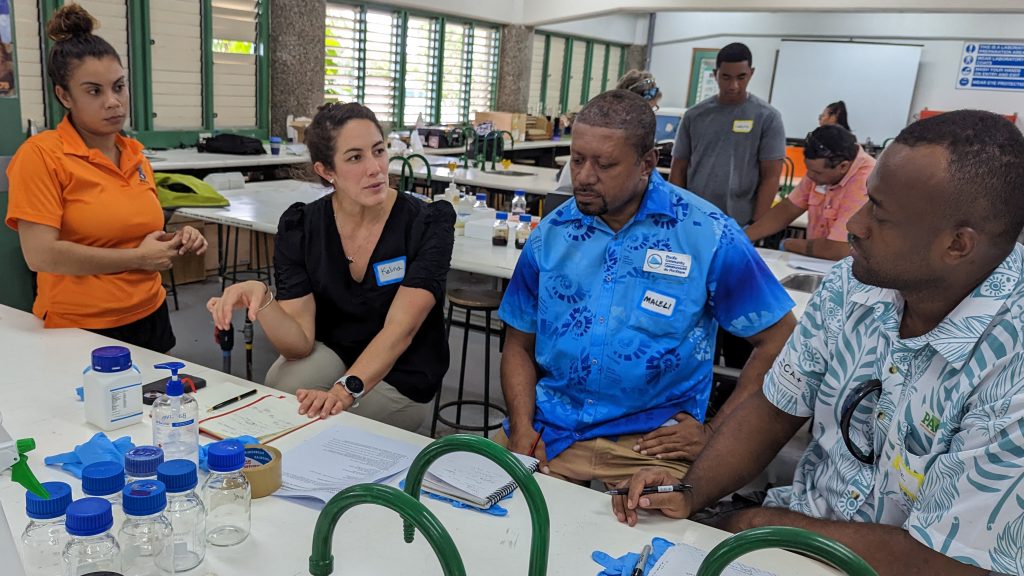Q & A with Knauss Fellow Kalina Grabb

Photo: Kalina sharing capacity with Pacific Island Scientists on carbonate chemistry best practices during a workshop for Global Ocean Acidification Observing Network in a Box Kit Recipients in Suva, Fiji in February 2023.
What are you doing during your Knauss Fellowship?
I am a Knauss Fellow in International Policy within the NOAA Ocean Acidification Program (OAP). As a part of this position, I am a secretariat for the Global Ocean Acidification Network (GOA-ON). I support ocean professionals around the world to increase OA research, capacity building, best practices, and translation of science to broader audiences. I have focused specifically on efforts to build capacity within the Caribbean and the Pacific. I also assist the mCDR program lead in addressing NOAAs priorities in mCDR and supporting the National Oceanographic Partnership Program (NOPP) mCDR grant recipients.
What has been the most positive part of being a Fellow? How about the most challenging?
I am fortunate to be exposed to a diversity of experiences and opportunities this year. I organize and facilitate many conversations with prominent international leaders and I get to be a part of discussions that are at the forefront of OA and mCDR research and policy. For example, I have had the opportunity to be a part of the 9-person writing team for the U.S. OA Action Plan, which is a deliverable of the US National Membership to the International Alliance to Combat OA and will be revealed as a COP28 deliverable.
The most challenging thing has been trying to respond to ~100 new emails each day in between 5-6 hours of meetings, let alone trying to accomplish other tasks that are outside of emails and meetings. It is a very different pace from PhD research and it is a new balancing act that requires efficiency, adaptability, and collaboration.
What’s one thing you’ve learned during your time in Washington, D.C. that has surprised you?
As I have transitioned from conducting science to supporting science, the urgency for science to be shared beyond the scientific community is greater than I previously realized. This year I have been exposed to many efforts that are trying to strengthen the conduits that translate science to action across decision makers, tribal nations, and stakeholders. There is a dire need to increase access to science so that end users can be informed and make science-based decisions.
What was the last thing you read?
I just finished Ministries for the Future by Kim Stanley Robinson, and I highly recommend it for anyone who thinks about science, policy, and our future in these changing climates!
Got any podcast recommendations?
I know this is not too exciting, but I am very loyal to the NYT Daily, especially during my one-hour bike commute in DC.
Who has been your inspiration?
I am very inspired by my former boss Libby Jewett, who was the director of NOAA Ocean Acidification Program until this June. She spearheaded the creation of this program since 2012 and throughout her tenure, creatively built up the program as an international leader in OA research, capacity building, and policy.
What’s the most interesting place you’ve ever visited and why?
As a Knauss Fellow, I am preparing to attend COP28. Although I have visited many different countries, I am expecting this to be the most interesting. I am going through more briefings, logistical preparations, and diplomatic collaborations than any other trip that I have prepared for. With representatives gathering from countries all over the world, I am looking forward to hearing the diverse perspectives and priorities expressed from different voices about some of the most pressing topics. Everyone is telling me that even after a week on the ground, I still won’t understand how it operates!
What is something about you that people would be surprised to learn about you?
Many people are surprised to learn that other than science, the industry that I have the most work experience in is VIP global hospitality management. I worked at seven international high level sporting events in six different countries, including the Olympic Games, FIFA World Cup, and Rugby Cup. This work experience has actually been very relevant as a Knauss Fellow since I am frequently coordinating large groups, hosting conferences and workshops, and organizing engagements with international audiences.
What’s your favorite quote from a book/movie or TV show?
Stemming from my years as an athlete, I always embraced this quote from Mia Hamm, which I have applied to my career passions as well: “Somewhere behind the athlete you've become and the hours of practice and the coaches who have pushed you is a little girl who fell in love with the game and never looked back... play for her.”
What are your plans post-fellowship?
My goal is to continue to bridge the gap between science and policy. Therefore, I am applying for post-docs where I can conduct science that is co-designed with end users, including communities, managers, and tribal nations to help increase decision makers’ readiness in the current changing ocean. I hope to develop new aspects of my marine chemistry skills, such as modeling, and conduct science that is actively used to inform decision making and policy. While waiting to hear about post-doc funding, I will likely keep my global hospitality skills fresh at the 2024 Paris Summer Olympic Games!
What would be your number one recommendation to a younger version of your self?
Aligned with my favorite quote, I have always made conscious decisions to pursue a career that I am passionate about. I would encourage my younger self to stay true to this while also not worrying too much about the far off future. I would tell her to focus on making the most out of each present situation and proceed one step at a time in the general direction that she is interested in and the future will follow accordingly.
Cats or Dogs?
Coral reefs!
